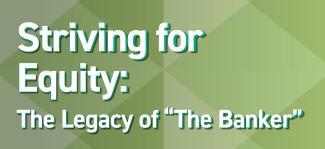
Striving for Equity: The Legacy of “The Banker” in Today's Financial Landscape
By Laura DeLaCruz, Senior Project Manager and Director of Business Development
February marks Black History Month, a time to honor the achievements and struggles of Black and African Americans throughout history. It is important to reflect on the strides made towards equality and empowerment within various sectors, including banking. I recently rewatched the 2020 movie "The Banker" and was inspired by how it explores the challenges faced by Black Americans in the world of finance and the impactful changes brought about by two visionary Black entrepreneurs.
"The Banker" is based on the true story of Bernard Garrett and Joe Morris and the film is set against the backdrop of the racially charged 1950s and 60s, showcasing the discrimination Black Americans faced in everyday life. Garrett and Morris, determined to break down these barriers, devise a plan to navigate the racially biased banking system by employing a white man, Matt Steiner, as the “face” of their enterprise.
One of the key aspects the movie explores is the historical reality of redlining, where banks denied loans to residents of predominantly Black neighborhoods, perpetuating economic inequality, and hindering the creation of wealth within Black families and communities. The film portrays the resilience of Garrett and Morris as they strategize and overcome obstacles to realize their dream of providing financial services to their community. At one point, their company owned 177 multi-unit residential properties (many of them in white Los Angeles neighborhoods), the “Banker’s Building” in downtown L.A. and two banks in Texas.
Beyond the historical context, "The Banker" prompts us to reflect on the current state of banking for people of color. While progress has been made since the 1960s, including the 1968 passage of the Fair Housing Act and the 1977 passage of the Community Reinvestment Act, racial disparities in access to credit and financial services persist. For example, among business applicants who sought loans, lines of credit and cash advances in 2022, Black-owned businesses were the least likely to be fully approved (20 percent approval rate versus 58 percent for white-owned businesses).¹ And there are still large gaps in homeownership by race: in Q3 2023, only 45.5 percent of Black Americans owned their home² vs 74.5 percent of non-Hispanic white Americans.³
All this prompts us to ask: How can we promote economic equality and inclusive financial opportunities for Black Americans today? Here are some suggestions.
- Increase access to affordable banking and financial services:
- Advocate the availability of banking services in underserved communities.
- Encourage the development of affordable and accessible financial products. In recent years, many banks have added free checking accounts to their product lineup and have reduced overdraft fees—although this may reduce fee revenue for banks, it is a win for consumers.
- Provide financial education:
- Implement comprehensive financial education programs in schools and communities. Knowledge is power: financial education can help improve credit scores, lower loan delinquency rates and reduce the use of high-interest payday loans.
- Support minority-owned businesses:
- Be intentional about shopping at Black-owned businesses. As business owners, people of color can establish financial independence and provide employment opportunities for others in their communities.
- Financial institutions can play a pivotal role by offering targeted loans and networking opportunities to help Black entrepreneurs establish and grow their businesses.
- Foster collaboration and mentorship:
- Create supportive environments that address the unique challenges faced by Black Americans, including racism, underrepresentation and limited access to capital and resources.
- Bridge the knowledge gap by encouraging collaboration between established professionals and aspiring entrepreneurs. Mentorship programs allows experienced professionals to share their expertise, industry insights and practical knowledge.
- Dismantle systemic bias:
- Implement comprehensive educational programs, in schools and in the workplace, that promote awareness of systemic biases, discrimination and privilege.
- Encourage organizations to adopt fair hiring practices, diverse leadership and inclusive decision-making processes.
This Black History Month, we should acknowledge the ongoing work towards ensuring equal access to the tools and resources needed for financial security and prosperity. Inspired by the resilience of pioneers like Bernard Garrett and Joe Morris, we need to strive for a financial landscape where opportunities are abundant, barriers are dismantled and economic empowerment is a reality for all.
MKP communications inc. is a New-York based marketing communications agency specializing in merger/change communications for the financial services industry
¹ fedsmallbusiness.org/survey/2023/report-on-employer-firms
² fred.stlouisfed.org/series/BOAAAHORUSQ156N
³ fred.stlouisfed.org/series/NHWAHORUSQ156N